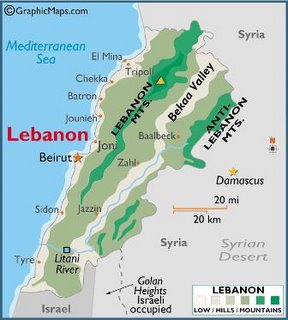Lebanon: Reconstruction and Rivalry

Lebanon: Reconstruction and Rivalry
Summary
Lebanese Finance Minister Jihad Azour warned Aug. 30 that the country could sink into a recession in the wake of $15 billion worth of destruction wrought by Israeli bombing during the 34-day conflict with Hezbollah and the continuing Israeli blockade. As Lebanon is rebuilt, an array of regional rivalries will emerge as Saudi Arabia, Qatar and Iran shop for influence in the country.
Analysis
Lebanese Finance Minister Jihad Azour said Aug. 30 that Lebanon faces $15 billion worth of reconstruction following Israel's military campaign against Hezbollah and warned that the Lebanese economy could soon plunge into a recession. Azour added, however, that the country's economic conditions could improve if Israel lifts its blockade.
Even before the war, Lebanon was struggling to pull itself out of a massive debt that stood at $38.6 billion -- 183 percent of the country's gross domestic product. Current Lebanese estimates of the economic impact of the war are as high as $9.5 billion. U.N. estimates put the number even higher, around $15 billion. In an economy where value-added taxes from trade (Beirut's port earned the government $5 million a day before the war) and tourism (mainly from Gulf Arab nations) made up 37 percent of annual Lebanese government income, relieving the debt will not be easy. The Israeli blockade -- intended to cut off arms and supplies to Hezbollah -- and tourists' travel fears have all but eliminated these sources of revenue. This is where the regional jockeying comes in.
Immediately after the war, Hezbollah began handing out $12,000 stipends to families that had lost their homes as a result of Israeli bombing. The funds, a total of $300-$400 million, came from Iran. While Iran's sponsorship of Hezbollah is no secret, these payments represent an aggressive move by Iran, along with Syria, to win greater influence in southern Lebanon. The move also serves as a counter to Saudi intentions to lead the reconstruction effort through the government's close business ties to Lebanon's al-Hariri clan. Not only does the Saudi government wish to undermine Iran's growing influence in the region, it also has to answer to Saudi citizens at home who have criticized the regime for publicly condemning Hezbollah in the early stages of the war.
Saudi Arabia, while well positioned in Lebanese politics, is outmatched in the grassroots politicking for support in southern Lebanon. After the Lebanese Civil War ended in 1990, it was Saudi money that fueled Rafik al-Hariri's rapid reconstruction of the capital. These links continue to this day, as Saad al-Hariri, who grew up in Saudi Arabia, seeks funds and political support from the Saudi royal family. But the Saudi reach stops just south of Beirut. The disenfranchised Lebanese Shia in the south, whose homes (about 33,000 of them) were destroyed during the conflict with Israel, are looking for immediate help. The government's recently unveiled plan to pay out up to $40,000 to each family whose home was destroyed rings hollow to a population used to seeking help from nongovernmental social services funded by Hezbollah. It also seems an impossibility considering the government's financial straits. Preconditions on receipt of the government money also make Hezbollah's no-questions-asked policy more appealing. Sheikh Hassan Nasrallah, the leader of Hezbollah, immediately announced that any government shortfalls would be made up by his organization and, ultimately, Iran.
The House of Saud's other challenge comes from Qatar. The emirate, which has consistently sought to counter Saudi influence in economic and social areas, is now looking to extend its own political power beyond the Gulf, beginning with Syria. Qatar has long resented Saudi Arabia's dominating role in the Gulf Cooperation Council and is searching for means outside the Gulf to undermine Saudi influence. Qatari Emir Hamad bin Khalifa al-Thani appears to be doing just that by making a concerted effort to rehabilitate Syria in the eyes of the United States and strengthen Syria's role in the Lebanese political system. Qatar has been acting as the go-between for Syria on one hand and the United States and Israel on the other. Through these communications, Qatar is essentially trying to steer Syria away from Iran and clear the Syrian government's name in the investigations into Rafik al-Hariri's assassination. In addition, Qatar has offered to financially support Syria's political allies in Beirut in a bid to sweep out the Future bloc in the next parliamentary elections. The Future bloc, run by the al-Hariri clan, is Riyadh's political extension in the Lebanese government.
Qatar is also joining in the bidding war in Lebanon. Khalifa was the first foreign head of state to visit Beirut after the war, doing so on Aug. 21, the same day he met with Syrian President Bashar al Assad in Damascus. While in Lebanon, Khalifa pledged to rebuild the southern cities of Bent Jbiel and Khiam, which were badly damaged during the fighting with Israel. Saudi Arabia's pledge of $1.5 billion toward reconstruction of 10 Lebanese villages and the shoring up of the Lebanese Central Bank, while generous, again must flow through Beirut and could be delayed in its impact if preconditions are attached to its distribution.
The economic situation in post-war Lebanon has brought regional rivalries to the fore, as a crippled Lebanese economy turns outward for help in rebuilding. While Saudi money and support is still welcomed in Beirut, Saudi Arabia is clearly facing intense competition from its rivals in the Gulf.